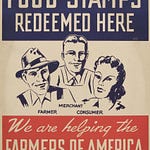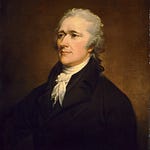
It’s not uncommon in my social circle to discuss Constitutional matters. Many of us swore oaths to the Constitution and remain committed to that ideal.
I recently had a friend posit that we should repeal the 12th Amendment. It’s a fascinating topic…
The 1800 Election
On February 17, 1801, following a protracted and contentious 1800 election, the US House of Representatives of the 6th Congress resolved a tie for the office of President between Thomas Jefferson and Aaron Burr. After a grueling 36 rounds of ballots, the House chose Jefferson as the third President of the United States. He served in the office from 1801 to 1809.
In the 1800 presidential election, the total number of possible electoral votes was 138. Therefore, candidates needed 70 electoral votes to win the presidency. Sitting President John Adams won 65 votes. Both Jefferson and Burr won 73 votes, enough ballots for each to win the Presidency outright. This deadlock threw the election into the House of Representatives.
This was only the fourth national Presidential election. There were 36 rounds of ballots and backroom negotiations, and the House of Representatives, rather than the vote, decided the presidency.
The original Constitution did not account for political parties and allowed voters to cast two votes for President, with both votes carrying equal weight. The candidate with the most votes became President, and the runner-up became Vice President. The event demonstrated electoral framework shortfalls and led to the ratification of the 12th Amendment in 1804. The new text outlined:
The Electors shall meet in their respective states, and vote by ballot for President and Vice-President, one of whom, at least, shall not be an inhabitant of the same state with themselves; they shall name in their ballots the person voted for as President, and in distinct ballots the person voted for as Vice-President…
The Amendment refined the electoral process by requiring electors to cast separate votes for President and Vice President, aiming to prevent future electoral impasses and delineate between the top two offices.
Teams of Rivals
In contrast to the 1800 election, parties today nominate only one person for the Presidency through a series of primaries and caucuses leading up to their respective national convention.
My friend posits we should repeal the 12th Amendment to the US Constitution so that the vice president will be from the opposing party and encourage the parties to work together. This divided relationship occurred in the 1796 election. President Adams had his political rival, Jefferson, as his Vice President.
The 1796 to 1800 Adams-Jefferson partnership was not a high-functioning executive team. However, President Lincoln later took this exact approach and saved the Union.
In her book Team of Rivals: The Political Genius of Abraham Lincoln, Doris Kearns Goodwin discusses how Lincoln appointed political adversaries to key positions in his administration. Lincoln believed the nation would benefit from the collective talents and strengths of the best minds, even if they had previously opposed him. During America’s most divisive period, he put preserving the Union above all other priorities and didn’t care what political party helped achieve that aim.
Lincoln’s humility gifted him with the ability to harness a wide range of ideas and perspectives, crucial for navigating the complex political and military challenges of the Civil War.
The 12th Amendment Today
The 12th Amendment is still relevant today.
In the 2020 election, Presidential candidates Trump and Biden needed at least 270 out of 538 electoral votes to win the office. President Biden won 306 votes, and President Trump won 232 votes. But it was closer than the final tally suggests.
Three states had razor-thin margins that could have theoretically shifted the outcome:
Georgia (16 electoral votes) - Biden won by 12,670 votes, a margin of 0.23%.
Arizona (11 electoral votes) - Biden won by 10,457 votes, 0.3%.
Wisconsin (10 electoral votes) - Biden won by 20,682 votes, 0.63%.
These states collectively have 37 electoral votes. All told, less than 44,000 votes in these three states swung the office to President Biden. If they had flipped in favor of Trump, neither candidate would have achieved the 270 electoral vote majority required to win outright. Both candidates would have had 269 electoral votes, resulting in a contingent election as outlined by the 12th Amendment.
In such a scenario, the election would have been decided by the House of Representatives, where each state delegation casts one vote. The 12th Amendment specifies this process, which becomes critical when no candidate secures a majority of the electoral votes. At the time, Democrats controlled the House of Representatives of the 117th Congress.
But that wasn’t the makeup of the state delegations.
On January 6, 2021, the day of the mob desecration of the US Capitol Building and immediately following the start of the 117th Congress, the composition of state delegations in the House of Representatives was as follows:
Democrat-majority state delegations: 22
Republican-majority state delegations: 26
Evenly split state delegations: 2 (Georgia and Pennsylvania, which had an equal number of Democratic and Republican representatives)
This means that, in the event of a contingent election in the House of Representatives, the Republican-majority state delegations would have had the advantage, as they controlled 26 state delegations compared to 22 controlled by the Democrats, with two delegations evenly split.
Would that have made a difference in the 2020 election?
The Vote
America is not a pure democracy. We are a democratic republic. Pure democracy threatens individual liberty. Liberty is the foundation of the Constitution. The founders designed America as a democratic republic to protect individual rights and prevent the tyranny of the majority by mediating public decisions through layers of divided power. This structure balances the will of the majority with the rights of the individual, ensuring a stable and just governance system. We try to be a democracy without the problems of democracy.
The founders, in their wisdom, passed the 12th Amendment after the 1800 election. Their aim was clear: to ensure that every vote, every voice, counts. This amendment was a crucial step in minimizing House of Representatives intervention in future presidential elections, paving the way for individual American votes to hold more weight.
We try to be a democracy that protects individual liberty, including the right for individual votes to count.
Should we repeal the 12th Amendment?
It would create more teams of rivals, which could enrich the executive branch with diverse ideas and solutions from across the political spectrum.
It would lead to divisiveness in the executive branch and challenge the smooth operation of government unless managed with exceptional humility, skill, and integrity.
A President who puts America above party could make it work. May we all hope for leaders with the wisdom and courage to put the nation first.
May God bless the United States of America.












